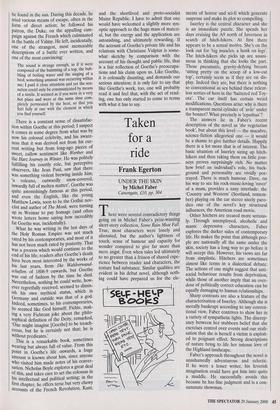Taken for a ride
Frank Egerton
UNDER THE SKIN by Michel Faber Canongate, £10, pp. 304 There were several contradictory things going on in Michel Faber's prize-winning short-story collection, Some Rain Must Fall. True, most characters were lonely and alienated, but the author's lightness of touch, sense of humour and capacity for wonder conspired to give far more than mere angst. Even when tales led ultimately to no greater than a frisson of shared expe- rience between reader and characters, the texture had substance. Similar qualities are evident in his debut novel, although noth- ing could have prepared us for the ele- ments of horror and sci-fi which generate suspense and make its plot so compelling.
Isserley is the central character and she is an immediate puzzle. She spends her days cruising the A9 north of Inverness in search of hitch-hikers. At first there appears to be a sexual motive. She's on the look out for 'big muscles: a hunk on legs'. The hitch-hikers she picks up are unani- mous in thinking that she looks the part. Those pneumatic, gravity-defying breasts 'sitting pretty on the scoop of a low-cut top', certainly seem as if they are on dis- play. Indeed they are, but there is nothing so conventional as sex behind these relent- less sorties of hers in the 'battered red Toy- ota'. The car itself has certain weird modifications. Questions arise: why is there a transparent metal cylinder of `aviir' under the bonnet? What precisely is `icpathua'? The answers lie in Faber's recent description of the novel as 'the vegetarian book', but about this level — the macabre, science-fiction allegorical one — it would be a shame to give further details. Happily there is a lot more that is of interest. The basic situation of Isserley sizing up hitch- hikers and then taking them on little jour- neys proves surprisingly rich. No matter how brief an individual's role, his back- ground and personality are vividly por- trayed. There is much humour. Dave, on his way to see his rock-music-loving 'raver' of a mum, provides a zany interlude: the `Coontry and Western' (Scotland, remem- ber) playing on the car stereo nicely paro- dies one of the novel's key structural influences, the American road movie.
Other hitchers are treated more serious- ly. Through unemployed, alcoholic and manic depressive characters, Faber explores the darker sides of contemporary life. He makes the point that although peo- ple are nationally all the same under the skin, society has a long way to go before it will accept this. However, his views are far from simplistic. Hitchers are sometimes almost like terms in a dialectical debate. The actions of one might suggest that anti- social behaviour results from deprivation, while those of another imply that an over- dose of politically correct education can be equally damaging to human relationships. Sharp contrasts are also a feature of the characterisation of Isserley. Although she is morally bankrupt according to any conven- tional view, Faber contrives to show her in a variety of sympathetic lights. The discrep- ancy between her stubborn belief that she exercises control over events and our reali- sation that she is herself a victim is exploit- ed to poignant effect. Strong descriptions of nature bring to life her intense love of the Highland landscape. Faber's approach throughout the novel is unashamedly adventurous and eclectic. If he were a lesser writer, his feverish imagination could have got him into quite a muddle. He successfully avoids this because he has fine judgment and is a con- summate showman.


















































































 Previous page
Previous page